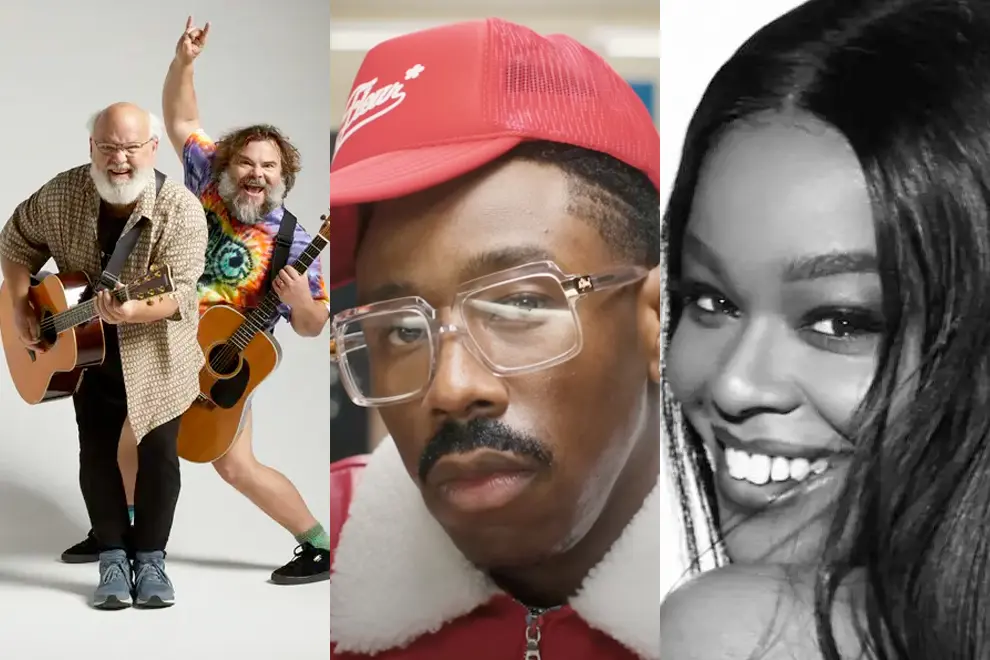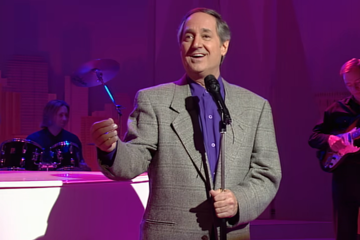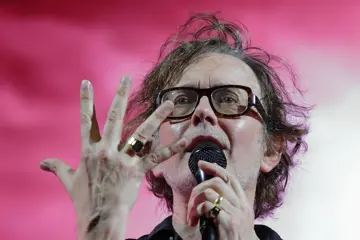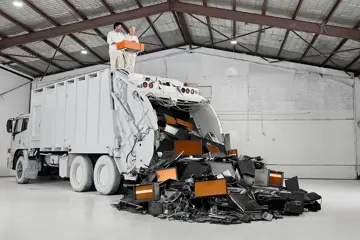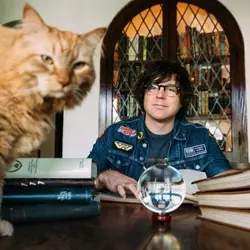 Ryan Adams
Ryan AdamsThis week brought with it the news that Ryan Adams will likely not be touring internationally again, going so far as to label Australia the“worst country ever, every time to play.”
“Thank fuck never again,” Adams said in a since-deleted social media post. “You are the worst people and you know it and the best you can go is copy Americans and UK culture.”
However, Adams’ anger over Australian audiences and his refusal never to come back is part of a tradition that goes back 57 years.
Here are ten instances.
The Who
Antagonism on The Who, Small Faces, and Paul Jones tour in January 1968 literally began minutes after they touched down at Sydney’s Mascot Airport.
Jetlagged after the 36-hour flight from London, they were herded into the VIP lounge for a press conference. There they were inundated with comments from the right-wing press, about “long hair scruffs” and “what drugs are you on?”
The rest of the tour was no different. The bands complained the stage equipment was “primitive”. The round stage had to be handled manually. It caused delays, and audiences who paid $3.50 each ($52.92 in today’s money) booed and threw coins at the stage.
Don't miss a beat with our FREE daily newsletter
Faced with this hostility, The Who and Small Faces swore at the crowd, leading to the NSW Premier demanding to know why the cops hadn't stopped the shows immediately.
On the early morning flight to Adelaide, the Australian opening act broke open a bottle of beer. That led to a clash with the cabin crew, and the entourage was arrested at their arrival. Tour promoter Kenn Brodziak knew the boss of the airline, Reg Ansett, and charges were dropped.
In other instances, The Who’s Pete Townshend smashed a photographer’s camera and punched out a journo who asked him about his drug intake. The guitarist declared he’d never return to Australia. He kept that promise for 36 years.
In Auckland, when the entourage celebrated Marriott’s 21st birthday by hurling things out of a hotel room, the police and army were called!
Frank Sinatra
When the man alternatively called ‘Ol’ Blue Eyes” and “Cranky Frankie” arrived in Melbourne in 1974, he read a newspaper reporting on alleged Mafia connections and womanising (“Frankie’s molls”).
That evening at the show at Festival Hall, Frank Sinatra sniffed, “They keep chasing after us. We have to run all day long. They’re parasites who take everything and give nothing.
“And as for the broads who work for the press, they’re the hookers of the press. I might offer them a buck and a half, I’m not sure.”
One union refused to let their members do the stage and lighting for the next Melbourne show, and it was cancelled. The transport union put a ban on refuelling any plane that had Sinatra in it.
He somehow got to Sydney where the media camped outside his hotel room for three days. An emergency call was made to the President of the Australian Council of Trade Unions Bob Hawke (later the PM) who thrashed out a joint statement of regret for the chaos.
Sinatra had been visiting Australia since the ‘50s, loved the audience, and regarded Sydney as one of the great music cities alongside New York and London.
But after this incident, he insisted he’d never return to Australia. It took a mighty big fee offer of $850,000 (today’s $2.36 million) before he came back in January 1988 to headline the opening of the lifestyle precinct Sanctuary Cove on the Gold Coast.
Azealia Banks
The first blast of anti-Australian sentiment came in 2015 at Splendour In The Grass when Azealia Banks lashed out at its patrons as “terrible crowds to play for” and “violent and belligerent”.
When she returned in December 2022 for a national tour, a visa problem delayed her arrival, forcing her to cancel the first show, in Melbourne. At a rescheduled concert, she played for 37 minutes after arriving an hour late.
There was a dispute with the promoter about the fee. The rate of the Australian dollar to the American greenback also set her off. "Y'all white people down here are broke and racist,” she said.
The Brisbane show was cancelled hours out because of a previous incident where someone threw a plastic bottle at her, calling “the most racist, most demoralising experience of my fucking life” and Australia as an “utterly miserable” country.
Deep Purple
When Deep Purple did a one-off headliner at the final Sunbury festival in 1975 – coming with enough gear to fill five truckloads – they had a stipulation. No act could play 30 minutes before or after their set.
AC/DC, who were next on, weren’t taking that. While Purple were still thundering away, the AC/DC drum kit – with their name on the bass drum advertising they were next – was wheeled onto side stage in full view of the 16,000 crowd.
There were scenes of Sunbury and AC/DC roadies exchanging blows with Purple’s crew. What’s more, the British band was the only one to be paid, which left a distaste with the Aussies.
But when Purple returned to tour nationally a few years later, the Musician’s Union stepped in. Until they coughed up what the Australian acts would have been paid union rates, they would be banned.
Tom Petty & The Heartbreakers
Tom Petty & The Heartbreakers toured Australia twice, first in 1980 and then in 1986 with Bob Dylan. Both times, the band had “a magnificent time”, co-founder Benmont Tench explained after Petty’s death in 2017. But Petty went cold on returning, even though he loved Australia and its audiences.
One reason was that the flight between Los Angeles and Sydney was too long for the guitarist not to have a cigarette. Another was that Petty was angry with the way the Musician’s Union treated Stevie Nicks who, on a whim, decided to join the 1986 trek.
Apparently, when Nicks joined the troops playing tambourine on Knockin’ On Heaven’s Door at the Sydney show, she was told by the Union she had not applied for a working visa, What’s more, if she appeared onstage on another city, Fleetwood Mac would be banned on their next trip here.
Beaumont, when quizzed about this, replied, “That sounds like Tom but I’m sure that’s not why. I am sure he wouldn’t be that mad. Why? It wasn’t Australia, it was the Union”.
SZA
SZA threatened to walk off the second of her three Melbourne shows in May 2024 after having to dodge shoes and mobile phones thrown onto the Rod Laver Arena stage.
“I will leave. Do not throw up any cell phones, I’m a person. That’s crazy,” she shouted.
Half a dozen videos circulated on social media showed security trying to break up a brawl in the audience, and another trying to do a handstand on a chair and crashing down someone else.
Fan posts lamented “concert etiquette out the window”, “Melbourne be ruining everything, behaving like their ugly muggy weather”, and “You had one fucking job Melbourne, now she won’t want to come back to Australia.”
Joe Cocker
The first Australian tour in October 1972 by the young 20-something soul singer from Sheffield went off brilliantly in Sydney, with Joe Cocker and band in fine form during their three-and-a-half hour shows, and the audiences responding in kind.
“Best rock show ever to hit Australia!” thundered one newspaper headline. The tour was “a big, wild party” according to drummer Jim Keltner.
Then it hit Adelaide, and everything turned into a skyfall.
At 10 am on Saturday, October 14th, police raided their hotel and busted five of the party for possession of Indian hemp. When asked if there was any dope around, Cocker had sleepily replied, “There’s some around here somewhere.”
The next day they fronted up in court and pleaded guilty. They were jailed for a few hours and fined $300 (about $3,782 today) and released on bail. He was given 48 hours to leave the country.
The daily newspapers were savage and whipped it up. One said Cocker “represents another in the succession of overseas entertainers who have come here and demonstrated contempt for our laws. Who needs him or his examples?”
A reporter said on TV: “If I had my way, Joe Cocker and his drugged-up group would be airlifted straight back across the Pacific. I’d make sure their passports are marked ‘never to return’. We don’t want this type here, they are as welcome as a load of Argentine fruit fly.”
By the time the tour ended up in Melbourne, the musicians were welcomed with one headline: “Get Out Cocker!”
As per The Guardian, the singer gave as good as he got. He told the audience, “In five years marijuana will be legalised in Australia, and the same cat who is trying to throw us out now will be smoking it himself.”
But that night he was arrested after a punch-up with his girlfriend in the foyer of the Chateau Commodore. He was bare-chested and barefoot. When the hotel’s manager told him he was no longer welcome on the premises, Cocker threw beer over him.
He was arrested and held overnight, facing charges of assault and resisting arrest. Immigration Minister Jim Forbes gave him four hours before he was deported, and dates in Brisbane and Perth collapsed.
Cocker said he’d never return to Australia. But he came back eleven more times and professed his love for Aussie crowds. He said the whole thing had been a political stunt because there was a national election due that December, and the pollies were scoring points.
“It’s something I will always remember,” he said later. “There was a lot of political intrigue. I believe we did get framed. We were all very mischievous, but there was a lot more to it. We were all set up by the same dealer.”
Meat Loaf
Executives from the Australian Football League and the bookers of its Grand Final entertainment Frontier Touring still tremble when they recall Meat Loaf’s disastrous pre-game set in 2011.
But Mr Loaf ducked the backlash that came his way, saying he was relieved to get out of Melbourne.
He called the AFL “the cheapest people I’ve ever seen in my life” and its executives “jerks.” He threatened that if he heard any other musician being booked for an AFL function, he’d ring them personally and talk them out of it.
All his critics were dismissed as “butt smellers” and “All those people that think I’m done can put their head in an oven.”
Tenacious D
Australia was the place where Jack Black (almost) broke up Tenacious D. During an onstage birthday celebration during the Sydney show for longtime bandmate Kyle Gass, a cake was wheeled out and the musician told to make a wish.
"Don't miss Trump next time," he said, alluding to the attempted assassination of Donald Trump the day before in the US at a rally where he was shot in the ear.
There were calls for them to be thrown out of the country. Black who was initially seen laughing at the comment, said he was "blindsided" and added, "I would never condone hate speech or encourage political violence in any form.”
The Newcastle show was cancelled, and Tenacious D left early. The Australian Ambassador to the US, Kevin Rudd, gave the comment a dressing down for making a joke about violence. “Grow up and get a real job,” Rudd snapped.
Tyler, The Creator
After a run-in with “a racist asshole” in a KFC outlet after a show in 2011, Tyler, The Creator branded Brisbane as "racist as fuck" and that it made him "uncomfortable".
Tyler’s apparent qualms about Australia have continued in the years since. Though he’s returned numerous times, his appearance at Sydney’s Qudos Bank Arena in August saw him addressing the elephant in the room.
“Shout out to all the black folks in the crowd,” he said to the sell-out audience. He continued walking across the stage and cheekily added, “Australia is the whitest place on Earth.”

